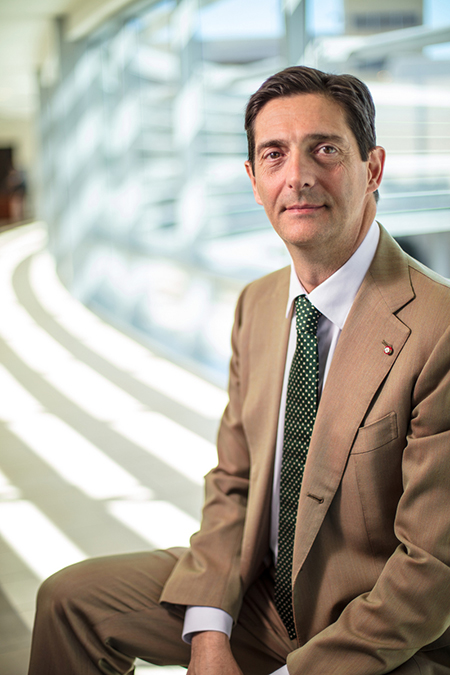
Kenny DeCay, 48, became the 1000th living donor kidney transplant recipient June 20 at the Baylor Annette C. and Harold C. Simmons Transplant Institute at Baylor University Medical Center. This is the first North Texas transplant program to reach the 1000th living donor kidney transplant milestone.
DeCay's donor was sister-in-law Janiece DeCay. Both are doing well following the surgery. Janiece has returned to her home in Atlanta while Kenny continues to recover at his Arlington, Texas, home.
A living donor kidney transplant is the fastest way to receive a kidney transplant. According to Giuliano Testa, MD, FACS, MBA, surgical chief of abdominal transplantation, Baylor University Medical Center, a living donor kidney typically is the best quality.
"It begins to function more quickly after transplant and lasts significantly longer than kidneys from deceased donors." said Dr. Testa. "Donating an organ is one of the greatest displays of love."
Living donation does not change the donor's life expectancy, does not increase the risk of other medical problems, and recovery after surgery is usually brief. Living donor transplant is easily scheduled at the convenience of both the donor and recipient. "Why did I do it? Why not?" said Janiece, the day after donating her kidney. "I'm blessed to be part of this family and this was something I wanted to do for my family. We all benefit."
Surgeons on the medical staff at Baylor University Medical Center perform an average of 32 living donor liver transplants annually. In 2017, 53 living donor kidneys were transplanted at the hospital.
Donating a kidney to a friend, family member or other person is a big decision. Baylor Scott & White Health has a dedicated living donor team readily available to answer questions and guide potential donors through the process. For more information about the living donor transplant program, visit BSWHealth.com/DallasTransplant. If you're interested in being a living organ donor, please complete the health history form at livingdonordallas.org.
Baylor Scott & White hospitals in North Texas and Central Texas are home to a highly experienced team of physicians, transplant surgeons and other clinicians on the medical staffs that provide comprehensive advanced heart, pancreas, liver, lung and kidney disease care and organ transplant services.
Physicians provide clinical services as members of the medical staff at one of Baylor Scott & White Health's subsidiary, community or affiliated medical centers and do not provide clinical services as employees or agents of those medical centers or Baylor Scott & White Health. ©2018 Baylor Scott & White Health.
# # #
About Baylor Scott & White Health
As the largest not-for-profit health system in the state of Texas, Baylor Scott & White is empowering customers to live well by reimagining traditional healthcare — creating more convenient, personalized and informed experiences. It serves more than three million customers through 53 hospitals, including flagship academic medical centers in Dallas, Fort Worth and Temple; the Baylor Scott & White Research Institute; 1,300+ access points; 59,000+ team members; and its leading digital platform — MyBSWHealth. The system's award-winning employer solutions include Baylor Scott & White Health Plan, Baylor Scott & White Quality Alliance and Levanto — a company offering digitally enabled health products. Founded as a Christian ministry of healing more than a century ago, Baylor Scott & White's mission is to promote the health and well-being of all individuals, families and communities. For more information, visit: BSWHealth.com
